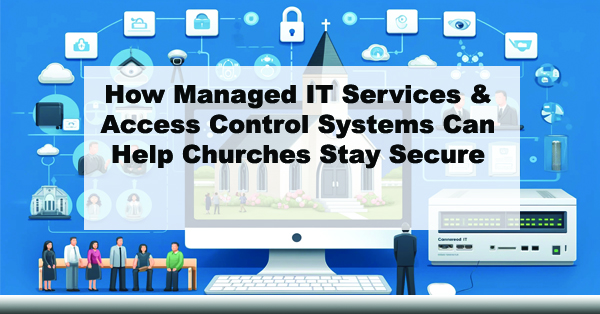
Why do Churches Need Managed IT Services and Access Control Solutions?
In today’s world, security is paramount for all organizations, including churches. Places of worship are not only spiritual sanctuaries but also hubs for community activities, education, and support services. Ensuring the safety of parishioners, staff, and students is a top priority.
This blog will explore how Managed IT Services (MITS) and Access Control Systems (ACS) can significantly enhance the security of churches. Additionally, we’ll discuss the national grants available to support these initiatives.
The Importance of Security in Churches
Churches are often seen as safe havens, but they are not immune to security threats. These threats can range from unauthorized access and theft to more severe incidents like violence. The presence of children in church-run schools or daycare centers further underscores the need for robust security measures. Moreover, churches often manage sensitive information, including personal data of their members, which needs to be protected against cyber threats.
Managed IT Services: A Comprehensive Security Solution
Let’s start with the basics. What are Managed IT Services?
Managed IT Services are a comprehensive suite of IT support and management solutions provided by external companies, known as Managed Service Providers (MSPs). These services are designed to proactively manage and support an organization’s technology infrastructure and end-user systems.
Instead of dealing with IT issues reactively, Managed IT Services offer continuous monitoring, maintenance, and management of IT environments. Here’s an in-depth look at what Managed IT Services encompass and how they can benefit various organizations, including churches.
Key Components of Managed IT Services
1. Network Monitoring and Management
MSPs continuously monitor an organization’s network for performance, security, and reliability. They use advanced tools to detect potential issues before they become significant problems. This proactive approach helps in maintaining network uptime and performance.
2. Cybersecurity Solutions
Managed IT Services include a robust suite of cybersecurity measures. These can range from firewalls, anti-virus software, and intrusion detection systems to more sophisticated solutions like Security Information and Event Management (SIEM) systems, and endpoint protection. MSPs also provide regular security assessments and vulnerability scans.
3. Data Backup and Disaster Recovery
Data is a critical asset for any organization. MSPs ensure that data is regularly backed up and can be recovered quickly in case of data loss or a disaster. This includes off-site backups and comprehensive disaster recovery plans to minimize downtime.
4. Cloud Services Management
With the increasing adoption of cloud technologies, MSPs offer services to manage cloud infrastructure, including cloud storage, cloud computing resources, and Software-as-a-Service (SaaS) applications. They ensure that cloud environments are secure, scalable, and optimized for performance.
5. Help Desk and Technical Support
One of the most visible aspects of Managed IT Services is the help desk support. MSPs provide 24/7 technical support to resolve IT issues that end-users may encounter. This support can be delivered remotely or on-site, depending on the situation.
6. IT Strategy and Consulting
MSPs don’t just fix IT problems; they also provide strategic guidance. This includes advising on technology upgrades, IT budget planning, and aligning IT infrastructure with business goals. They help organizations stay ahead of technological trends and ensure that IT investments deliver value.
7. Software and Hardware Management
MSPs manage the entire lifecycle of software and hardware, from procurement to deployment and maintenance. This includes patch management, updates, and ensuring that all systems are running the latest versions to prevent security vulnerabilities.
8. Compliance and Risk Management
Many industries have specific regulatory requirements for data protection and IT security. MSPs help organizations comply with these regulations by implementing necessary controls and providing regular compliance audits. This reduces the risk of non-compliance and potential penalties.
Managed IT Services provide a comprehensive approach to security that covers both physical and digital aspects.
Here’s how MITS can help churches enhance their security:
1. Network Security
MITS providers ensure that a church’s network is secure from external threats. They implement firewalls, intrusion detection systems, and anti-virus software to protect against cyber attacks. Regular security audits and vulnerability assessments help identify and mitigate potential risks.
2. Data Protection
Churches handle a significant amount of sensitive data, including personal information of parishioners, financial records, and staff details. MITS ensures this data is encrypted and backed up regularly. In case of a breach or data loss, recovery solutions are in place to restore information quickly.
3. 24/7 Monitoring and Support
With Managed IT Services, churches benefit from around-the-clock monitoring. This means any unusual activity can be detected and addressed immediately. The support team is available to resolve any IT issues, minimizing downtime and ensuring continuous protection.
4. Compliance and Risk Management
Many churches may not be aware of the specific compliance requirements related to data protection and security. MITS providers help ensure that churches comply with relevant regulations, thereby reducing the risk of legal issues and potential fines.
5. Cloud Security
As more churches move their operations to the cloud, securing cloud-based services becomes crucial. Managed IT Services include securing cloud infrastructure and applications, ensuring that data stored in the cloud is safe from breaches and unauthorized access.
Access Control Systems: Enhancing Physical Security
Access Control Systems (ACS) are essential for managing and monitoring who enters and exits church premises. Here’s how ACS can enhance the security of churches:
1. Controlled Entry Points
ACS allows churches to control entry points effectively. Only authorized individuals can access certain areas, reducing the risk of unauthorized entry and potential threats. This is particularly important for areas like offices, classrooms, and server rooms.
2. Visitor Management
With an ACS in place, churches can keep track of visitors. This includes logging entry and exit times, which can be crucial in case of an incident. Visitor badges and check-in systems ensure that everyone on the premises is accounted for.
3. Emergency Response
In case of an emergency, ACS can facilitate a quick and organized evacuation. These systems can be integrated with fire alarms and other emergency systems to ensure that all doors unlock automatically, allowing for a safe and swift exit.
4. Surveillance Integration
Many ACS can be integrated with surveillance systems, providing a comprehensive security solution. Cameras at entry points can record who enters and exits, and this footage can be reviewed if an incident occurs.
5. Remote Management
Modern ACS offer remote management capabilities, allowing church administrators to monitor and control access from anywhere. This is particularly useful for churches with multiple buildings or locations.
How Managed IT Services Benefit Churches
1. Enhanced Security
Churches often handle sensitive data, including personal information of parishioners, financial records, and operational data. Managed IT Services provide enhanced security measures to protect this information from cyber threats.
2. Reliable IT Infrastructure
With Managed IT Services, churches can ensure that their IT infrastructure is reliable and always available. This is crucial for daily operations, community outreach programs, and events.
3. Cost Efficiency
Churches often operate on tight budgets. Managed IT Services provide a cost-effective solution for maintaining and securing IT systems without the need for a full-time IT staff.
4. Focus on Mission
By outsourcing IT management, church leaders and staff can focus on their core mission of spiritual guidance, community service, and outreach programs without being bogged down by IT issues.
5. Compliance with Regulations
Churches may be subject to various data protection and privacy regulations. MSPs help ensure compliance with these regulations, reducing the risk of legal issues and enhancing the trust of parishioners.
6. Support for Virtual Services
In the wake of increased reliance on virtual services, including online sermons and digital outreach, MSPs provide the necessary support to ensure these services run smoothly and securely.
National Grants for Church Security
Implementing advanced security measures can be costly, but there are national grants available to help churches fund these initiatives. Here are some notable grants:
1. Nonprofit Security Grant Program (NSGP)
Administered by the Federal Emergency Management Agency (FEMA), the NSGP provides funding support for physical security enhancements. Churches can apply for grants to cover costs related to security equipment, training, and other security-related projects.
2. Church Mutual Insurance Company Grants
Church Mutual offers grants specifically for security enhancements. These grants can be used for installing access control systems, surveillance cameras, and other security measures.
3. Department of Homeland Security (DHS) Grants
The DHS provides various grants aimed at enhancing the security of nonprofit organizations, including churches. These grants can help fund physical security improvements, cybersecurity initiatives, and emergency preparedness training.
4. State and Local Grants
Many states and local governments offer grants to help religious institutions improve their security. Churches should check with their local government offices for available funding opportunities.
5. Private Foundation Grants
Several private foundations provide grants for security enhancements in places of worship. Examples include the Lilly Endowment and the Pew Charitable Trusts. These foundations often support projects that enhance community safety and security.
Steps to Secure Funding
Securing funding through grants requires careful planning and preparation. Here are some steps churches can take to increase their chances of success:
1. Identify Security Needs
Conduct a thorough assessment of the church’s current security measures and identify areas that need improvement. This will help in creating a detailed and compelling grant application.
2. Research Available Grants
Identify the grants that best fit the church’s security needs. Review the eligibility criteria, application deadlines, and required documentation.
3. Develop a Comprehensive Plan
Create a detailed security plan outlining the proposed enhancements. Include information on the type of equipment needed, installation costs, and how these measures will improve security.
4. Gather Support
Seek support from church leadership and the community. Letters of support from parishioners and local officials can strengthen the grant application.
5. Submit a Strong Application
Ensure the application is complete and free of errors. Highlight the importance of the security enhancements and how they will benefit the church and the community.
6. Follow Up
After submitting the application, follow up with the grant provider to confirm receipt and provide any additional information if requested.
Conclusion
In an era where security threats are increasingly prevalent, churches must take proactive steps to protect their communities. Managed IT Services and Access Control Systems offer comprehensive solutions for enhancing both digital and physical security. By leveraging national grants, churches can implement these critical security measures without bearing the full financial burden.
Investing in security is not just about protecting property; it’s about safeguarding the people who rely on the church for spiritual guidance, education, and community support. By taking advantage of available resources and funding, churches can create a safe and secure environment for all.
